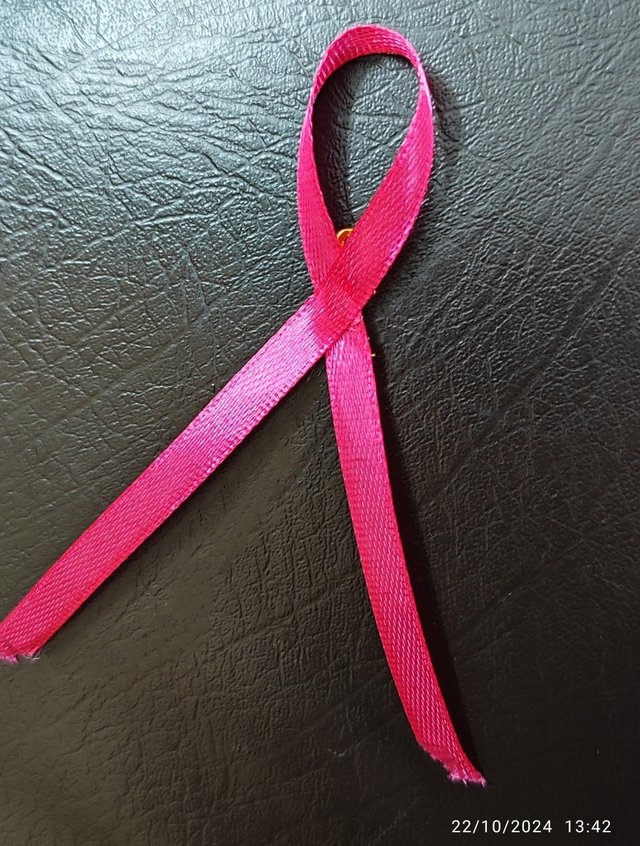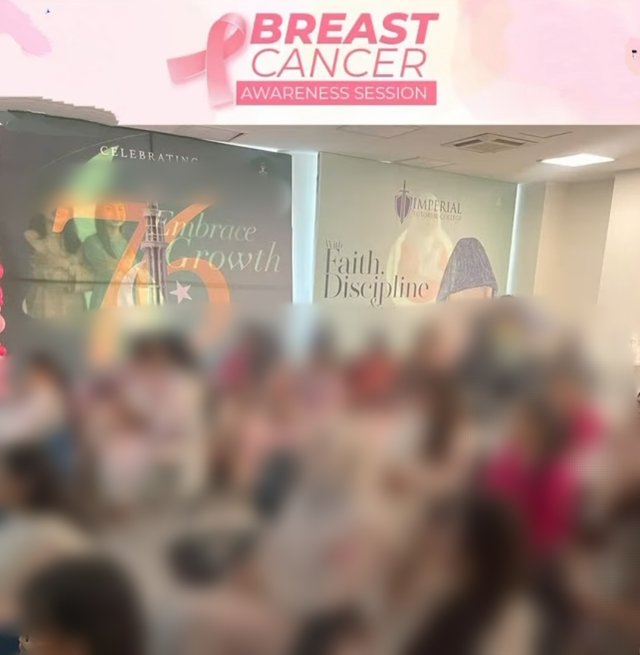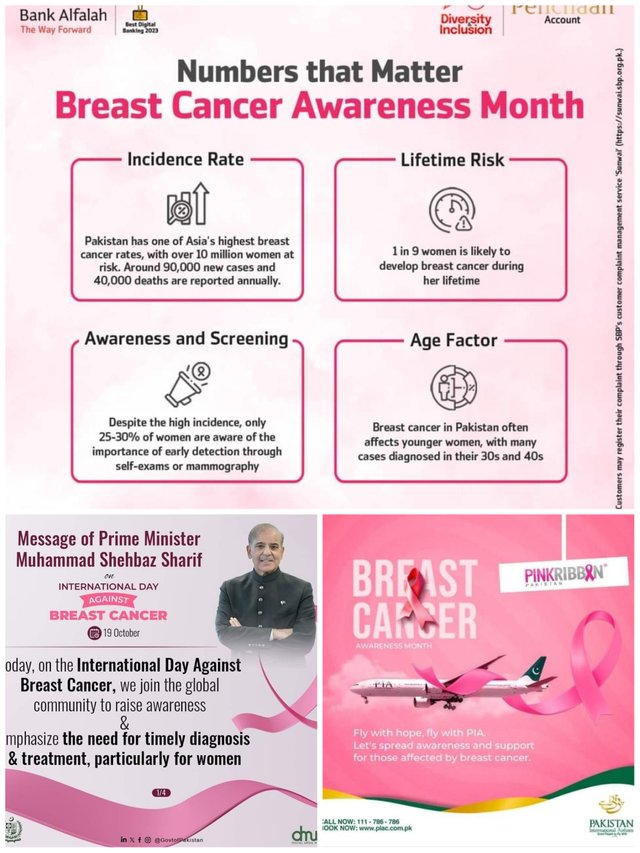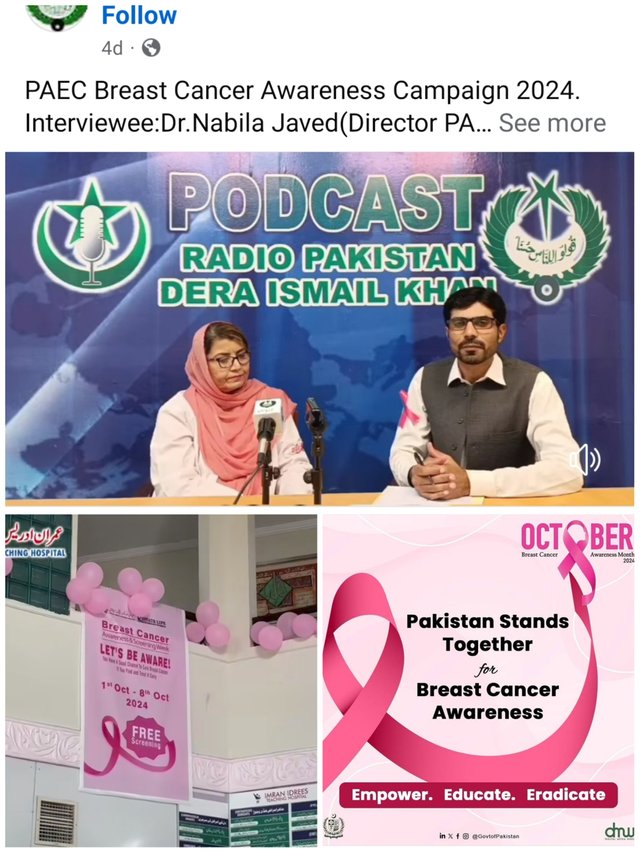PINKtober: Breast Cancer Awareness

This morning, I attended a lecture on breast cancer awareness delivered by a doctor from our own community. As I sat there, I couldn’t help but reflect on how far behind we are in providing even basic health facilities, let alone advanced medical care. It made me wonder: what’s the purpose of these campaigns and all this effort when we’re still struggling with the fundamentals?

The month of October also called as PINKtober, from the 1st to the 31st, is dedicated to raising awareness about breast cancer and supporting various campaigns worldwide. While I won’t go into the technicalities of diagnosis or treatment today, consider this a reminder about the importance of staying informed. In countries like Pakistan, where the timely diagnosis of illnesses, particularly breast cancer, is often neglected unless someone is personally affected, awareness becomes even more critical.
Globally, breast cancer is the most common cancer in women. According to statistics, 1 in every 8 women will be diagnosed with breast cancer during her lifetime. While advancements in medical science have reduced the mortality rate over recent decades, it remains alarming that 1 in 38 women still succumbs to this disease. These numbers emphasize the importance of regular screenings and early detection, as they can drastically improve survival rates.
Source: American Cancer Society (2023) – Breast Cancer Facts & Figures 2022-2023.
 Media Engagement Across Platforms. There is a lot going on across social media and TV media as well.
Media Engagement Across Platforms. There is a lot going on across social media and TV media as well.Sitting in the audience were women from the lowest income class of our community. You could tell by their expressions that they were only there because someone had forcibly brought them along—just another checkbox for the organizers, pictures taken, and the task completed. I personally know one or two of these women, and after the lecture, I had a chance to speak with them. I’m fully aware of their financial situations, and I can almost say with 99% certainty that the moment they walked out of the hall, they didn’t give breast cancer a second thought. Their lives are consumed with daily survival. For them, putting food on the table is an achievement in itself—worrying about something like cancer is simply out of reach. I would even say: a luxury that they can't afford!
During the session, the doctor demonstrated self-diagnosis techniques and emphasized the critical importance of early detection. She rightly pointed out that early detection doesn’t just save lives—it offers a lifeline for those diagnosed, providing them a better chance at effective treatment and a longer, healthier life. When breast cancer is caught in its early stages, the chances of successful treatment and survival increase significantly. Raising awareness and encouraging routine checkups could be the key to reducing the impact of this disease worldwide.
As true as this statement is, it requires a mindset that I feel is lacking. Sometimes, it seems as though many women don’t even have a strong desire to keep themselves healthy, as if they’ve lost the will to prioritize their well-being. In this overwhelming age, burdened by the responsibilities of children and in-laws, I don’t think most of these women even have the mental space to worry about their health. Their lives are so consumed by immediate challenges that something as distant as cancer prevention feels irrelevant to them.
This is where our campaigns may fall short. While awareness is crucial, we must also recognize that for many women, especially in vulnerable communities, their immediate needs overshadow long-term health concerns. Until we address their more pressing issues and cultivate a mindset that values self-care, the message of early detection may continue to fall on deaf ears.
I can't stop thinking about the effectiveness of these campaigns. This stark reality shows how disconnected they can feel to those in the most vulnerable communities. Yes, awareness is essential, but we must recognize that for many, immediate needs take precedence over future health risks. Perhaps our approach needs to evolve—bridging the gap between survival and long-term health concerns, meeting people where they are, and addressing their current realities.
 Nationwide Initiatives for Public Awareness: These campaigns are held on both national and private levels.
Nationwide Initiatives for Public Awareness: These campaigns are held on both national and private levels.I'm writing this in my country's community because this is the reality, this is the mindset. Even if I were to set aside the issue of poverty or financial strain, how many women—and not just women, but also the men connected to them—give importance to this awareness? Let me give you an example from my own home. My father is a doctor, yet I don't think he has ever paid attention to this matter or had my mother assessed. Awareness... So, what exactly is the problem here? Is it only about breast cancer, or are we genuinely careless as a society?
It's a question of whether our lack of awareness is driven by indifference, cultural norms, or a deeper societal issue where health concerns, particularly for women, are overlooked!
And yet again, it’s not only women—men too, especially those from the lowest tiers of society. They don’t have the luxury, and yes, I would call it a luxury, to think about these "trivial" issues. For them, survival takes priority, and health concerns like these often feel secondary or out of reach.
So, am I saying that these campaigns are useless or unnecessary? No, absolutely not. I fully support raising awareness. But there's this nagging thought inside me that doesn't let me rest. It forces me to question whether, after all this effort we're putting into awareness, is it really making a difference? What's the essence of all this effort? There is benefit, no doubt. But somewhere, something is lacking, which is why we don't see the desired results. And until someone is personally affected by this illness, they don't take any precautions.
So, I ask you all to make a promise with me. Please promise. That today, you will check your self for any signs and symptoms of breast cancer, or you will encourage your wife, daughter, or sister in whatever capacity to do so. Because your/their life is precious.
@suboohi: For your kind attention. I would also like to inquire about what constitutes a 'verified member.' I have already been verified by the Steemit Newcomers team, but I was wondering if there is any other verification process as well.
Yes, it is a terrible thing but it can be faith healed by a male using a rod of Solomon, chakra wand, or similar device.
My wife had one the size of something between a golf ball - tennis-ball in her left breast. It takes many, many attempts. It is not a one wand wave. At least, it was not for me.
Keep up the good work
I truly hope your wife is doing better now. It must have been an incredibly difficult experience for both of you. Has she fully recovered?